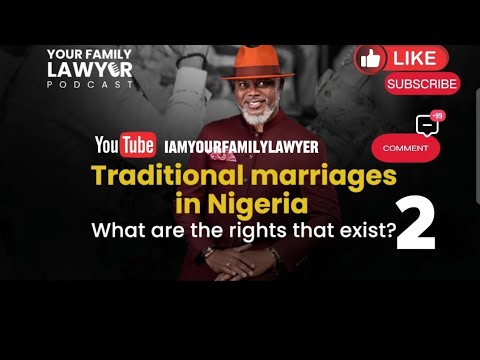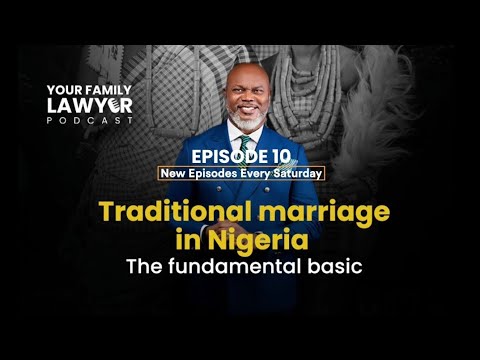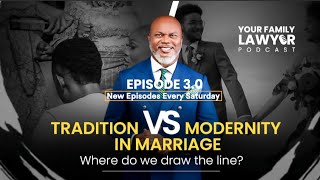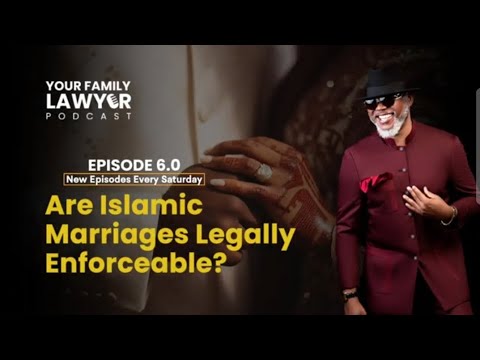Legal Implications of Traditional Marriages – Part 2: Divorce and Separation
“Welcome to Your Family Lawyer, the podcast where we simplify legal complexities and empower you with knowledge. In today’s episode, we’re tackling a sensitive yet important topic: divorce and separation in traditional marriages under native law and custom.
We’ll explore how customary courts handle disputes in traditional marriages and tell you the story into a real-life divorce case. Then, we will unbundle the legal implications of spousal rights in such divorces. By the end of this episode, you’ll have a clearer understanding of how traditional marriages and separations are addressed within Nigeria’s diverse legal landscape.”
Segment 1: Divorce and Separation in Traditional Marriages
“Divorce in traditional marriages is governed by customary laws, which vary significantly across Nigeria’s ethnic groups. Unlike statutory marriages, which are dissolved through formal court proceedings under the Matrimonial Causes Act, traditional marriages often rely on community-based dispute resolution mechanisms. There is now however, a fundamental saving grace: All such divorce processes and mechanisms must not only be fair but must be seen to be just. The inimitable yardstick is that the procedures and rules of enforcement must not be in breach of equity, natural justice and good conscience.
Key aspects of divorce in traditional marriages include:
- Family Mediation: Divorce is often mediated by family members and elders, who attempt to reconcile the couple or agree on the terms of separation.
- Grounds for Divorce: These can include:
- Infidelity by either spouse.
- Desertion or abandonment.
- Failure to fulfill marital obligations, such as financial support or inability or refusal to conjugate.
- Incompatibility or irreconcilable differences.
- Return of Dowry: In many communities, the dowry paid by the groom’s family must be returned to dissolve the customary and symbolic bond of marriage.
Unlike statutory divorces, which require evidence and formal procedures, divorce in traditional marriages is often rooted in cultural and social expectations. For example, in some Nigerian cultures, the inability to bear children can be a ground for divorce. The elders’ decision carries significant weight and often determines whether the marriage is dissolved peacefully or escalates to a customary court.”
Segment 2: Customary Court Rulings on Traditional Marriage Disputes
“When family mediation fails, divorce disputes are escalated to customary courts, where the judges or panel members base their decisions on the specific native laws and customs of the community. Customary courts can address several aspects of divorce, such as:
- Custody of Children: In many cultures, young children remain with the mother, while older boys may live with the father.
- Return of Dowry: The court often enforces the return of the dowry or determines whether it is forfeited based on the circumstances of the divorce.
- Financial Support: Customary courts may order the husband to continue providing financial support to the wife or children after the divorce.
It’s important to note that customary courts prioritise preserving community harmony and adhering to local traditions. However, these rulings sometimes clash with modern legal principles, such as gender equality or constitutional protections.”
“For instance, while statutory law might enforce spousal property division, customary courts may allocate property based on cultural norms, which could disproportionately favour one spouse. This difference highlights the challenges of bridging traditional practices with formal legal systems.”
Customary Law Divorce and Separation in Nigeria:
Key Elements of a Valid Customary Marriage Divorce:
- Return of Bride Price:
- One of the critical elements of a valid customary marriage divorce is the return of the bride price. This act symbolizes the end of the marital union and restores balance between the families involved.
- Involvement of Families:
- Customary divorce involves the families of both parties. Meetings are typically held to discuss and agree on the terms of the separation, including the return of the bride price and any other cultural obligations.
- Formal Declaration:
- A formal declaration or ceremony is often required to signify the end of the marriage. This may be done through community elders, family heads, or a customary court.
- Legal Recognition:
- For a contentious divorce, the dissolution to be legally recognized, it should ideally be documented and, in some cases, taken to a customary court to obtain a formal judgment.
- The bottom line and determining yardstick for those who know their rights is that the rules governing traditional divorce must pass the golden test of compliance with equity, natural justice and good conscience. Another way of saying this is that the woman’s constitutional rights must not be breached.
Segment 3: Case Study – CUSTOMARY DIVORCE
Summary:
Under the Okrika customary law an “Iya” marriage could be dissolved at will by the husband by sending the wife back to her parents. The woman was then free to remarry and any children of the subsequent marriage belonged to the new husband. Similarly, the wife could call the husband before the chiefs and have them work out how much was to be paid to him by way of refunding the bride price and all other expenses, including the “Ikpo” and “Okuru” clothes. If the husband accepted that refund, the marriage was at an end but if he refused to accept the refund, the marriage continued to subsist and there was nothing the woman could do to get free from it and any children she had by the new husband were regarded as the children of the former husband and were treated as bastards.
The father of a woman, sought a declaratory judgment to set out his rights under the Okrika customary law relating to an “Iya” marriage, claiming that he was entitled to compel the husband to receive repayment of the various payments made by him in respect of the marriage to the daughter which had been broken down. The woman had left him for another man and had several children but the husband refused to release her and consequently the children were considered illegitimate.
Held:
The court struck down the obnoxious Okrika native law and custom whereby a man can prevent his wife from divorcing him forever, though he has a free right to divorce her at will is a custom repugnant to natural justice, equity and good conscience and as such will not be enforced by the court.
Narrator:
Segment 4: Legal Implications – Spousal Rights in Divorce Under Native Law and Custom
By understanding and certain these principles, individuals can ensure that their customary marriages are dissolved in a manner that is both culturally respectful and legally sound.
“Divorce in traditional marriages has unique legal implications, especially regarding spousal rights. These include:
- Property Rights: Customary law often does not recognize joint property ownership, which can leave one spouse usually the wife without a claim to marital assets.
- Child Custody: Decisions are typically guided by cultural norms, with younger children often remaining with the mother.
- Dowry: The return of dowry is a critical component of divorce under native law, but this practice can place financial strain on the wife or her family.
- Maintenance: While not always enforced, some customary courts now recognize the need for financial support to ensure that the wife is not left destitute.
The lack of documentation in traditional marriages can complicate these issues, as courts rely heavily on oral testimonies and the recollections of elders.”
- Elaboration:“A major challenge is the intersection of customary and statutory law. For example, if a customary divorce ruling conflicts with constitutional protections, such as gender equality, statutory courts may intervene to ensure that the rights of both spouses are upheld.”
“In conclusion, divorce in traditional marriages reflects the deep cultural and communal ties within Nigerian society. While customary courts strive to resolve disputes in line with native laws, the outcomes can sometimes clash with modern legal principles.
If you are navigating a divorce under native law and custom, it’s crucial to understand your rights and obligations under both customary and statutory law. Consulting a lawyer familiar with these intersections can help you secure a fair outcome.
That’s all for today’s episode of Your Family Lawyer. Be sure to join us next time as we explore the financial impact of marriage. Until then, stay informed and stay empowered!”







